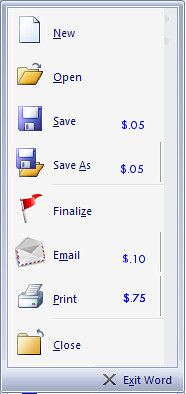MS Office - free, but pay for services?
 There's a very interesting article in this month's issue of Business 2.0 about Ryanair's innovative business model. This is an incredibly successful business model - Ryanair's profit margin is about 3 times Southwest Airlines' margin ; Ryanair is said to have the strongest financials of any European airline.
There's a very interesting article in this month's issue of Business 2.0 about Ryanair's innovative business model. This is an incredibly successful business model - Ryanair's profit margin is about 3 times Southwest Airlines' margin ; Ryanair is said to have the strongest financials of any European airline.
Ryanair lets 1/4 of their passengers fly for free, but they charge for just about everything. There are no free peanut packages, and each checked bag costs $3.50. They keep costs really low, and take advantage of every opportunity for profit - outside of ticket sales.
Remind you of another market? Microsoft Office seems like it's in a similar position as the big airlines were about 8 years ago - profitable, but ready for a shakeup. OpenOffice.org opens, edits, saves, and prints all the standard MS Office formats, and now there's the threat of some serious pressure from the AJAX Office apps. The MS Office cash cow is past its prime (pardon the pun).
Steve Gillmor is certain that Office is dead and will be bundled with Windows soon, but I'm not so sure. It seems that Microsoft's going overboard with the "don't get sued thing", to the extent that they don't bundle much useful software with Windows. Microsoft's not going to bundle Office with Windows this decade.
 Gillmor's convinced that Office will turn into an ad-supported AJAX application momentarily, but I think there are quite a few practical obstacles to an MSN adCenter powered Office. The Office customer base doesn't seem like a good fit for a billboard ad model:
Gillmor's convinced that Office will turn into an ad-supported AJAX application momentarily, but I think there are quite a few practical obstacles to an MSN adCenter powered Office. The Office customer base doesn't seem like a good fit for a billboard ad model:
- Corporate Office users won't tolerate the potential of lost work in exchange for free software. In other words, corporate environments are willing to buy software that allows their users to keep working, even when they don't have access to the internet.
- Corporate Office users aren't a good customer base for contextual ads. Most corporate employees don't have purchase authority, so contextual ads aren't a very high percentage bet. The fact that they're not empowered to make impulse buys is huge; beyond that, the whole effort / reward structure is stacked against it - why risk annoying your boss just to buy a product that makes your job look unnecessary? Just keep making the doughnuts...
- Corporate IT budgets aren't structured in favor of ad-hoc purchaces. They're structured to handle planned, bulk purchases... like Office licenses.
I could go on, but I won't... partly because I don't want to look too stupid if Gillmor's right...
Still, there's a lot to be said for a free / cheap Office with paid additional services. Like a Ryanair flight, you'd be able to get from Point A to Point B for free, but you'll pay for any niceties along the way. Want to spell check that document? Sure - 50 cents, please. Print? Okay, I'm deducting 5 cents per page from your account. Fax this document to Japan? $8.50.
Does that make sense? Sure it does. You've got a product that's a heck of a lot more professional than some Nascar stickered ad-ware, you can make deals to bundle MS-Bucks with a new computer, you can easily set up subscriptions without making customers feel screwed, and you've got a revenue stream that's tied to necessary activities. Typing a document's a no brainer, but what good's a document you can't print or save? More importantly, how much would you pay to save a document you've spent 3 hours typing?
MS Office should consider a move to a three tiered model:
- Office Premium - Hefty license fee, everything's paid for
- Office Standard - Free or cheap / bundled software, but you pay for important services
- Office Free - Ads pay for the software and services, but you're converted to an Office Standard user if you're not bringing in enough ad revenue
The point is software business model spectrum's a lot broader than a Shrinkwrap or Adware decision. There's a huge range of options, and selling Office software is a lot different than monetizing search.